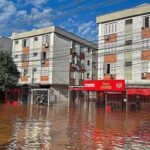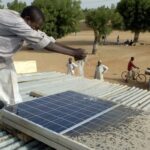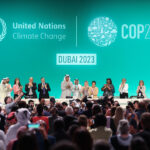Posts tagged with 'resilience'
Every three years, ICLEI hosts the ICLEI World Congress to showcase how subnational actors advance sustainable urban development worldwide. The most recent installment, ICLEI World Congress 2024, held June 18-21 in São Paulo, Brazil, converged over 1,500 global attendees to ...

India is the seventh most climate-vulnerable country in the world, with nine of its states among the top 50 most vulnerable regions globally. The country’s cities are at the forefront of the climate crisis with more than 80% of the urban population living in ...

Bogotá, Colombia is in the throes of a water crisis. After several months of dry weather caused by El Niño, the Chingaza reservoir system, which provides 70% of Bogotá’s water, reached its lowest level in history. The city’s over 8 million residents are ...

In March 2024, the inaugural Buildings and Climate Global Forum convened more than 1,000 participants to spur action towards built environment decarbonization and resilience. The first-of-its-kind forum was welcome, as the sector needs a shakeup. The big issue on the table was ...

After a week of record-breaking rainfall in Rio Grande do Sul, Brazil is experiencing an environmental and humanitarian tragedy. The death toll from the floods is in the dozens. The number of missing persons has surpassed 100. Hundreds are injured, ...

By early 2025, countries are due to unveil new national climate commitments under the Paris Agreement, known as nationally determined contributions (NDCs). These commitments form the foundation of international climate action, establishing emissions-reduction targets and other measures that countries promise ...

Last year shattered global heat records. The world witnessed the effects of rising temperatures in the form of devastating wildfires, severe flooding, extreme heatwaves and more. Poor countries and communities who have contributed the least to causing the climate crisis ...

India aims to reduce the emissions intensity of its economy by 45% by 2030, compared to 2005 levels, and to achieve net-zero emissions by 2070. The country can’t achieve either goal without a radical transformation in its buildings and construction sector, which was responsible for around 17% of the nation’s ...

By David Waskow, Jennifer Layke, Nate Warszawski, Preety Bhandari, Gabrielle Swaby, Natalia Alayza, Jamal Srouji, Mario Julien Díaz, Edward Davey, Rogier van den Berg, Roman Czebiniak, Paige Langer and Nathan Cogswell on December 19, 2023
The COP28 climate talks began with a new fund to address the increasingly severe losses and damage vulnerable countries face from climate impacts and concluded with the first international agreement to tackle climate change’s main driver: fossil fuels. Those bookends to the Dubai summit ...

In Asia, 14 countries — accounting for 26% of global transport emissions in 2019 — have made economy-wide net zero commitments. Momentum towards zero-emission transport is growing with countries enhancing ambition and including transport-related targets in their nationally determined contributions (NDCs). However, ...

In the Seychelles archipelago in east Africa, flooding and erosion caused by rising sea levels pose an imminent threat to the country’s many low-lying islands. At the same time its mangrove forests, which serve as a vital buffer against these ...

Against the backdrop of the Africa Climate Summit and Africa Climate Week, Nairobi hosted the UN Environment Programme’s fourth annual International Clean Air Day for blue skies event with Nairobi City County Governor, Sakaja Johnson, on September 7th, 2023. This ...

Public vehicle fleets, which include everything from city buses and school buses to garbage trucks and law enforcement vehicles, make up a significant share of traffic on U.S. roads. There are 645,000 vehicles in the federal fleet, 500,000 in state fleets across the ...

In the Wadala neighborhood of Mumbai, representatives from Kigali, Durban and Mauritius filed into a low, yellow-walled room. They took their seats in rows equipped with desktop computers. Ordinarily, these desks would be filled with the staff responsible for tracking real-time ...

If you’re a regular reader of TheCityFix, you’re no stranger to the vital role that cities play in shaping the future of our planet. From leading the shift to zero-emission transportation networks to advancing solutions to curb plastic waste at ...




























